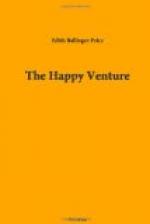The talk ran on the awakening of Applegate Farm, the rose-bush, lessons in the orchard, many details of the management of this new and exciting life, which the Maestro’s quiet questioning drew unconsciously from the eager Sturgises.
“We’ve been talking about nothing but ourselves, I’m afraid,” Felicia said at last, with pink cheeks. She rose to go, but Kirk pulled her sleeve. No afternoon at the Maestro’s house was complete for him without music, it seemed, and it was to the piano that the Maestro must go; please, please! So, through the French windows that opened to the terrace, they entered the room which Kirk had never been able to describe, because he had never seen it. Ken and Phil saw it now—high and dim and quiet, with book-lined walls, and the shapes of curious and beautiful things gleaming here and there from carved cabinet and table.
The Maestro sat down at the piano, thought for a moment, and then, smiling, rippled into the first bars of a little air which none of his listeners had ever before heard. Eerily it tripped and chimed and lilted to its close, and the Maestro swung about and faced them, smiling still, quizzically.
“What does it mean?” he asked. “I am very curious to know. Is it merely a tune—or does it remind you of something!”
The Sturgises pondered. “It’s like spring,” Felicia said; “like little leaves fluttering.”
“Yes, it is,” Ken agreed. “It’s a song of some sort, I think—that is, it ought to have words. And it’s spring, all right. It’s like—it’s like—”
“It’s like those toads!” Kirk said suddenly. “Don’t you know? Like little bells and flutes, far off—and fairies.”
The Maestro clapped his hands.
“I have not forgotten how, then,” he said. “It has words, Kenelm. I hope—I hope that you will not be very angry with me.”
He played the first twinkling measures again, and then began to sing:
“Down in the marshes the sounds begin
Of a far-away fairy violin,
Faint and reedy and cobweb thin.”
Cobweb thin, the accompaniment took up the
plaintive chirping till the Maestro sang the
second verse.
“I say,” said Ken, bolt upright in his chair. “I say!”
“Are you angry?” asked the Maestro. He flung out his hands in a pleading gesture. “Will he forgive me, Kirk?”
“Why, why—it’s beautiful, sir!” Ken stammered. “It’s only—that I don’t see how you ever got hold of those words. It was just a thing I made up to amuse Kirk. He made me say it to him over and over, about fifty-nine times, I should say, till I’m sure I was perfectly sick of it.”
“Having heard it fifty-nine times,” said the old gentleman, “he was able to repeat it to me, and I took the opportunity to write it off on a bit of paper, because, my dear boy, I liked it.”
“A lovely, scrumptious tune,” said Kirk. “It makes it nicer than ever.”




